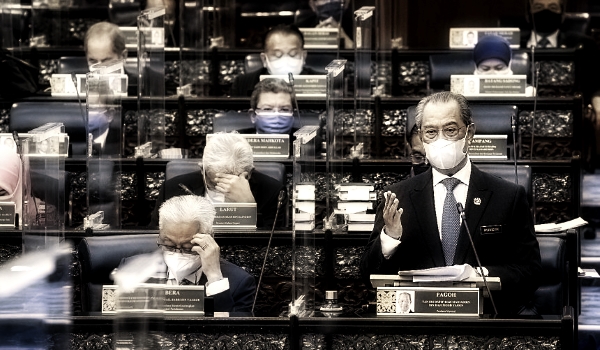Sin Chew Daily
The parliament finally got to reconvene on July 26 at the order of His Majesty Yang di-Pertuan Agong.
There are only five days of the special sitting that will feature solely briefings by the PM, DPM and three cabinet ministers. MPs will only be allowed to post their questions after each briefing but no debates and voting are allowed.
Such an unusual modus operandi has since sparked tremendous outcry among opposition lawmakers, and intense exchanges of words are therefore well within anticipation.
If MPs on both sides of the political divide remain uncompromising over the next couple of days, such a parliamentary sitting is believably not what His Majesty had wanted when he ordered that the parliament reconvene as soon as possible, much less desired by the general public.
So, what are these people actually disputing about?
Firstly, is this first sitting after the parliament reconvenes a regular parliamentary sitting or just a "special sitting"? Secondly, is it constitutional for the government to annul the emergency ordinances on July 21? And thirdly whether debates should be allowed when discussing the country's anti-virus policies?
His Majesty ordered in late June that the parliament reconvene as soon as possible before August. If the parliament were to reconvene as normal, then it should be a regular parliamentary sitting that allows debates and voting.
Opposition Leader Anwar Ibrahim pointed out at Monday's sitting that the ruling party should not call for a "special parliamentary sitting" as provided under Dewan Rakyat Standing Order 11(3), but this was rejected by Speaker Azhar Azizan Harun as it is a prerogative of the prime minister.
Meanwhile, former prime minister Tun Mahathir also said Monday's sitting was just a government briefing session and not a "parliamentary sitting" ordered by the King.

Obviously, to the ruling party, this is going to be a special sitting, not a regular parliamentary sitting. So, lawmakers can only listen quietly during the briefings and then ask questions, but there will not be any debate or voting.
What about the emergency decree proclaimed on January 12? Minister in the PM 's department Takiyuddin Hassan says the state of emergency will end as scheduled on August 1, and that the emergency ordinances were voided and annulled by the government on July 21 under Article 150(3) of the Federal Constitution.
As Anwar has said, the state of emergency and the emergency ordinances are all major decisions that ought to be debated and passed in the parliament with royal consent.
We did not know beforehand about the annulment of the emergency ordinances. As DAP's Ngeh Koo Ham has said, there has been no relevant statement or gazette on the revocation of the emergency ordinances on the websites of MKN or the Attorney-General's Chambers, thus there is this constitutionality question on the government's move to revoke all the emergency ordinances.
It looks like we can only wait for the government's explanation.
Additionally, we must also admit that the government's anti-virus initiatives have failed badly with the only exception of the national immunization program.
For the 195 days since the emergency decree was proclaimed on January 12, the country has reported a total of 889,730 new COVID-19 cases, with a daily average 11 times of pre-emergency period. In the meantime, 7,646 new deaths have been reported, with a daily average 23.5 times higher.
There is no dispute that the government's anti-virus policy has been a big flop and as such, the government should give lawmakers an appropriate opportunity to voice up in the parliament in order to draw up more effective measures to fight the virus.
Former PM Mahathir has said that against the backdrop of a growingly serious pandemic, what the elected reps want is not a government briefing but the opportunity to debate government policies to address the rakyat's woes.
While delivering his briefing on the national recovery plan at the parliament on Monday, PM Muhyiddin Yassin said the nation should stand united during the current trying times and that the government will not overlook the people's plight and will take proactive actions to save lives and livelihoods.
While we believe the PM indeed will do his utmost for the people, the question now is whether the opposition is willing to work with the government for the sake of the nation and people.
ADVERTISEMENT
ADVERTISEMENT


































